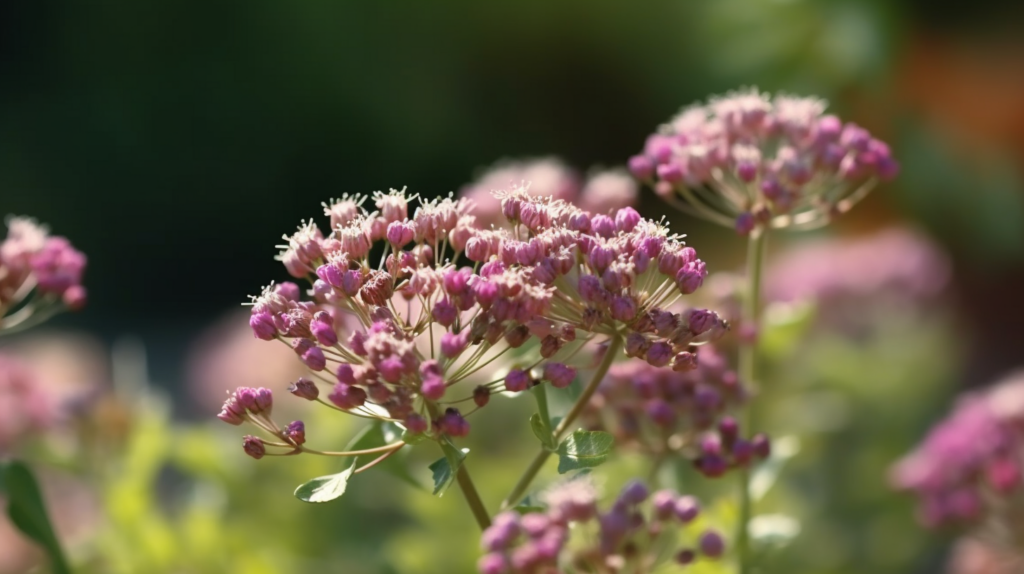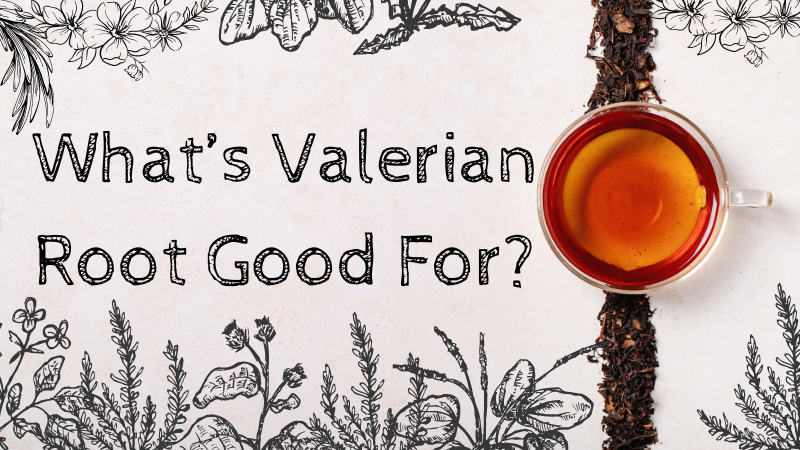Are you struggling to fall asleep at night or struggling with stress that just won’t let up? If you’ve found yourself nodding, you’re not alone, and you’re in the right place. Welcome to a comprehensive guide that answers the burning question: “What’s valerian root good for?”
Valerian root has been a go-to remedy for various ailments for centuries, but in our modern world of technology and pharmaceutical solutions, its benefits are often overlooked. From its sleep-inducing properties to its role in reducing anxiety, valerian root is a natural powerhouse that deserves a second look.
So, grab a cup of HerbiTea, settle in, and let’s delve into the fascinating world of valerian root.
By the end of this article, not only will you understand its myriad benefits, but you’ll also be equipped with the knowledge to incorporate it into your own wellness routine.
Stay with us, and let’s learn more about the mystery of what valerian root is truly good for. Your body and mind will thank you.
Table of Contents
What’s Valerian Root good for?
Valerian Root, scientifically known as Valeriana officinalis, is a perennial herb native to Europe and Asia. Over time, it has also found its way to various other parts of the world, including the United States. The plant is recognised for its roots and underground stems, known as rhizomes, which are the primary components used in medicinal preparations. 1
The herb has been a part of traditional medicine for thousands of years, and its roots are commonly processed into various forms for consumption. These forms commonly include supplements, tinctures (liquid extracts), and teas.

Valerian root is primarily known for its mild sedative properties, making it a popular choice for those seeking a natural sleep aid. It is often consumed to treat insomnia and to alleviate symptoms of anxiety. The herb is considered safe for most adults for short-term use, typically around 28 days. 2
What does Valerian Root taste like?
The taste of valerian root tea is described as “woody” or “earthy,” and some people may find its aroma to be less than pleasant. To enhance its flavour, it’s common to add honey or mix it with other herbs. 3
Health Benefits of Valerian Root
Now that we’ve explored a bit about what’s valerian root good for, you may be wondering about the broader health benefits of this intriguing herb.
The versatility of valerian root extends far beyond just sleep and relaxation. From scientific studies to age-old knowledge, valerian root benefits have been the topic of interest of researchers and wellness enthusiasts alike.
So, fasten your seat belts as we dive deeper into the myriad health benefits that valerian root has to offer.
Is Valerian Root Good for Sleep?
Valerian root has been the subject of numerous studies and articles that attest to its efficacy in improving sleep quality.
Let’s consider the outcomes of a systematic review and meta-analysis specifically focused on the efficacy of valerian root for sleep improvement. This review concluded that valerian root has potential benefits for improving sleep quality. 4
Another research study concluded that valerian root is commonly used as an ingredient in sleep aid supplements. It is believed to help with relaxation and mood symptoms like anxiety, which can contribute to better sleep. 5
Furthermore, a study conducted by Mohammad Reza Tammadon, et al, published in the Oman Medical Journal found that valerian root significantly improved sleep quality in hemodialysis patients.
The study involving 39 patients was a randomised, double-blind, crossover clinical trial that showed marked improvements in sleep quality, depression, and state anxiety scores among the participants. 6
Valerian Root Treatment For Anxiety and Stress
Valerian root has been traditionally used as a natural remedy to treat anxiety and stress, and modern research supports its efficacy.
Tammadon, et al, identified that valerian root can interact with gamma-aminobutyric acid (GABA), a neurotransmitter that helps regulate nerve impulses in your brain and nervous system.
Increased levels of GABA can lead to sedation, which helps alleviate symptoms of anxiety and stress. Another study suggests that valerian root extracts have anxiolytic effects, which are likely mediated through the GABAergic system.
Further supporting this, Researchers assessed the efficacy of Vagonotte, a natural sleep aid made from valerian, hop, and jujube. They tested if it helps improve sleep. Some participants received the plant mixture, while others got a placebo. The results showed that those who took the plant mixture experienced better sleep quality. They fell asleep faster, had fewer interruptions, and felt more refreshed during the day. 7
The authors over at Mount Sinai reviewed some 30 studies and determined that they acknowledged the usefulness of valerian root for insomnia. 8
While the exact mechanisms are still not fully understood, the existing body of research suggests that valerian root can be a beneficial natural remedy for those looking to manage anxiety and stress. It’s important to consult a healthcare professional for proper diagnosis and treatment options, especially if symptoms persist.
Pain Relief During Menstrual Pain and Menopause Symptoms
If you encounter discomfort or pain either leading up to or during your menstrual cycle, there are natural solutions that may alleviate your symptoms. What’s valerian root good for beyond anxiety and insomnia? It has been found that valerian root can quell muscle contractions and ease discomfort, making it a potentially effective option for managing menstrual cramps.
Valerian root has traditionally been used to alleviate menstrual pain through its antispasmodic properties, which help reduce muscle spasms and calm the nervous system.
Consumed as a tea or supplement, it aims to relieve the discomfort associated with menstrual cramps. However, the scientific evidence supporting its use for menstrual pain is limited and reasonably calls for more research. 9
Its sedative effects are known to help with insomnia, while its anxiolytic properties could help with managing mood swings. Despite these potential benefits, the available data by Kenda et al. to date does not fully endorse its use for menopause symptoms. 10
Effects of Valerian Root
As we delve deeper into the therapeutic potential of natural remedies, it’s worth turning our attention to the broader spectrum of effects attributed to Valerian root. Now, we will explore these additional health benefits, shedding light on why the Valerian root continues to be a subject of scientific inquiry.
Short-term Effects and Long-term Effects
Valerian is generally considered safe for most people, but it can come with some minor side effects such as:
- feeling dizzy,
- sleepy
- headaches
- stomach discomfort
Some people also report mental fog and unusually vivid dreams. If you’ve been using Valerian for an extended period, abruptly stopping it may lead to withdrawal symptoms. 11
Meanwhile, the long-term use of valerian root has been a topic of interest in the field of herbal medicine. According to sources such as the National Center for Complementary and Integrative Health (NCCIH) and the American Academy of Family Physicians (AAFP), valerian root is generally considered safe for short-term use, particularly in the management of sleep disorders and anxiety.
However, the long-term safety and effects of valerian root are less clear. While there is limited evidence to suggest that valerian root may have mild, positive effects on sleep quality and anxiety when used over extended periods, it’s crucial to note that comprehensive, high-quality long-term studies are lacking.
Furthermore, the potential for dependence or withdrawal symptoms with prolonged use is a concern that requires further investigation. As with any herbal remedy, it’s advisable to consult with a healthcare provider before using valerian root regularly and to monitor for any adverse effects. 12
Psychological Symptoms of Menopause
The menopause transition is a natural phase in a woman’s life, often accompanied by various physical and psychological changes. Understanding these changes can help in distinguishing this period more comfortably.
- Mood swings and irritability 13
- Feelings of sadness or depression
- Anxiety and panic attacks
- Decreased libido (sex drive)
- Difficulty concentrating and memory lapses
Recognizing these symptoms and seeking support is crucial, as they can significantly impact daily life and well-being during menopause.
On the other hand, the transition into menopause is a natural phase in a woman’s life, but it often brings a myriad of psychological symptoms. These can range from mood swings and irritability to more severe manifestations like anxiety and depression. As women navigate this challenging period, finding effective remedies to alleviate these symptoms becomes crucial. Below are some of how valerian root can help menopausal symptoms:
| Mood Regulation | Valerian root has been shown to have anxiolytic effects, helping to reduce anxiety and stabilise mood swings. |
| Sleep Improvement | Valerian root can improve sleep quality, which indirectly can help in mood regulation and overall psychological well-being. |
| Reduction in Hot Flashes | While not directly a psychological symptom, hot flashes can disrupt sleep and contribute to mood disturbances. Valerian root has been suggested to reduce the frequency and severity of hot flashes. |
| Natural Alternative | For women who prefer natural remedies over hormone replacement therapy or antidepressants, valerian root offers a natural alternative to manage psychological symptoms. |
According to the researchers P. Mirabi et al. valerian root has been identified as a potential therapeutic agent for menopausal women. Its sedative and anxiolytic properties can be particularly beneficial for those experiencing anxiety and sleep disturbances during menopause.
Is It Safe To Take Valerian Root?
Valerian Root’s General Safety
According to the National Institutes of Health, valerian root is generally considered safe for adults when used for short periods. However, they emphasise that the long-term safety of valerian root has not been well-studied. Therefore, while it may be safe for short-term use, caution should be exercised when considering it for extended periods
Okay, so we’ve covered a lot of ground looking at the scope of what’s valerian root good for in this article. As a key consideration with anything you may be thinking about adding to your routine, your specific needs should be suitably assessed beforehand. If you’re pregnant, or planning to be, exposure to Valerian root when pregnant may not be ideal. Ensure you do your research before making this a part of your day.
Can Valerian Root Kill You?
There’s a lack of proof to indicate that consuming valerian root in large quantities is hazardous or can kill you. While there are isolated cases suggesting side effects from elevated doses, no scientific data confirms that such high levels pose a risk of fatality. 14
What’s Valerian Root Good For: Precautions Drug Interactions
If you’re presently taking any of the sedative medications, or similar, listed below, consult your healthcare professional before using valerian root.
This is not one of those outcomes to chase in the what’s valerian root good for discussion. The consequences of combining these might not be so great. Valerian has the potential to amplify the sedative effects of certain medications including:
- Medications for seizure control, like phenytoin (Dilantin) and valproic acid (Depakote) 15
- Various sedative barbiturates
- Anti-anxiety medications (Benzodiazepines), including alprazolam (Xanax) and diazepam (Valium) 16
- Sleep aids, such as zolpidem (Ambien), zaleplon (Sonata), eszopiclone (Lunesta), and ramelteon (Rozerem) [8]
- Tricyclic mood elevators, for example, amitriptyline (Elavil), and [8]
- Alcoholic beverages [3]

FAQs
Why does Valerian Root smell so bad?
Valerian root has a pungent odour primarily due to the presence of volatile compounds, including valerenic acid and isovaleric acid. These compounds contribute to its distinctive and strong smell, often described as unpleasant.
Why does Valerian Root smell like poop?
So this is probably one of the most intriguing questions I was asked during my research into what’s valerian root good for.
Valerian root has a strong, unpleasant odour that some people describe as similar to the smell of dirty socks or, in some cases, poop. Yep.
This odour is due to the presence of certain compounds, including valeric acid, which contributes to its distinctive scent.
Is it OK to take Valerian root every day?
Yes, it is generally safe to take Valerian root daily for short periods, but long-term daily use should be discussed with a healthcare professional to avoid potential side effects or tolerance issues.
When does Valerian Root kick in?
Valerian root typically takes about 3-4 weeks to kick in, but the exact onset can vary from person to person.
Is Valerian Root natural?
Yes, Valerian root is natural. It is derived from the roots of the Valeriana officinalis plant and is used for its potential health benefits, particularly in promoting relaxation and sleep.
Is Valerian Root illegal to use?
No, Valerian root is not illegal. It is a legal herbal supplement that is commonly available over the counter in many countries. However, regulations regarding its sale and use may vary by region, so it’s essential to check local laws and regulations.
Who should not take Valerian Root?
Pregnant and breastfeeding women, children under the age of 3, and individuals with liver disorders should not take Valerian root. Additionally, anyone with known allergies or sensitivities to Valerian or related plants should avoid it.
It’s crucial to consult with a healthcare provider before starting any new herbal supplement, especially if you have underlying health conditions or are taking other medications.
What are the benefits of taking valerian root?
For many, there are benefits directly connected to reducing stress and anxiety. We cover these two, and many others extensively in a series of articles on our website. However, there are considerations you will need to make depending on your specific needs.
Conclusion
Valerian root is a versatile herbal remedy with a range of potential benefits. Its primary uses include promoting relaxation, reducing anxiety, improving sleep quality, and providing relief from menstrual pain and menopausal symptoms.
Valerian root’s natural sedative properties are attributed to compounds like valerenic acid, making it a popular choice for those seeking a natural approach to managing stress and sleep disturbances.
While Valerian root offers numerous advantages, it’s essential to use it responsibly and consult with a healthcare professional, especially if you’re pregnant, nursing, or taking other medications. Its safety and efficacy can vary from person to person, so individual experiences may differ.
Ultimately, Valerian root serves as a valuable addition to the world of natural remedies, providing a potential solution for various health concerns. To fully harness its benefits, it’s wise to explore its uses further and consider incorporating it into your wellness routine under the guidance of a professional healthcare provider.
Share your thoughts on ”What’s Valerian Root Good For – 6 Astonishing Health Benefits of Valerian Root You Must Know” in the conversation on Instagram and Pinterest. We’d love to hear from you!
References
- “Health Benefits of Valerian Root” – J. Kubala, 24 January 2023 [Health] [Archive] ↩︎
- “Valerian” – PubMed Staff, Last checked 7 September 2023 [PubMed] [Archive] ↩︎
- “What to know about valerian tea” – H. Ames, 28 January 2022 [Medical News Today] [Archive] ↩︎
- “Valerian for Sleep: A Systematic Review and Meta-Analysis” – S. Bent, A. Padula, D. Moore, M. Patterson, W. Mehling, 26 February 2006 [PubMed] [Archive] ↩︎
- “Valerian Root in Treating Sleep Problems and Associated Disorders—A Systematic Review and Meta-Analysis” – N. Shinjyo, G. Waddell, J. Green, 21 October 2020 [PubMed] [Archive] ↩︎
- “The Effects of Valerian on Sleep Quality, Depression, and State Anxiety in Hemodialysis Patients: A Randomized, Double-blind, Crossover Clinical Trial” – M. Tammadon, M. Nobahar, Z. Naieni, A. Ebrahimian, R. Ghorbani, A. Vafaei, 18 July 2020 [Oman Medical Journal] [Archive] ↩︎
- “Evaluation of effectiveness and safety of a herbal compound in primary insomnia symptoms and sleep disturbances not related to medical or psychiatric causes” – G. Palmieri, P. Cotaldi, G. Fogliame, 26 May 2017 [PubMed] [Archive] ↩︎
- “Valerian” – Mount Sinai Staff, Last checked 7 September 2023 [Mount Sinai] [Archive] ↩︎
- “The effect of Valerian root extract on the severity of pre menstrual syndrome symptoms” – Z. Moghadam, E. Rezaei, R. Gholami, M. Kheirkhah, 5 February 2015 [Open Direct] [Archive] ↩︎
- “Herbal Products Used in Menopause and for Gynecological Disorders” – M. Kenda, N. Glavac, M. Nagy, M. Dolenc, 31 October 2021 [MDPI] [Archive] ↩︎
- “Valerian – Uses, Side Effects, and More” – Web MD Staff, Last checked 7 September 2023 [Web MD] [Archive] ↩︎
- “Valerian” – S.Hadley, J. Petry, 15 April 2003 [American Family Physician] [Archive] ↩︎
- “Menopause and your mental wellbeing” – NHS Inform Staff, 8 September 2023 [NHS Inform] [Archive] ↩︎
- “Valerian overdose: a case report” – L. Willey, S. Mady, D. Cobaugh, P. Wax, Last checked 8 September 2023 [PubMed] [Archive] ↩︎
- “Could valerian have been the first anticonvulsant?” – M. Eadie, Last checked 8 September 2023 [PubMed] [Archive] ↩︎
- “The Sleep-Enhancing Effect of Valerian Inhalation and Sleep-Shortening Effect of Lemon Inhalation” – T. Komori, T. Matsumoto, E. Motomura, T. Shiroyama, 20 July 2006 [Oxford Academic] [Archive] ↩︎
Last Updated on 2 months by D&C Editorial Team




